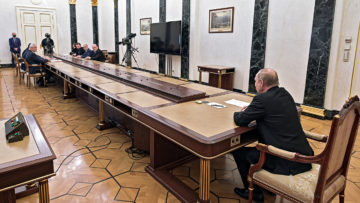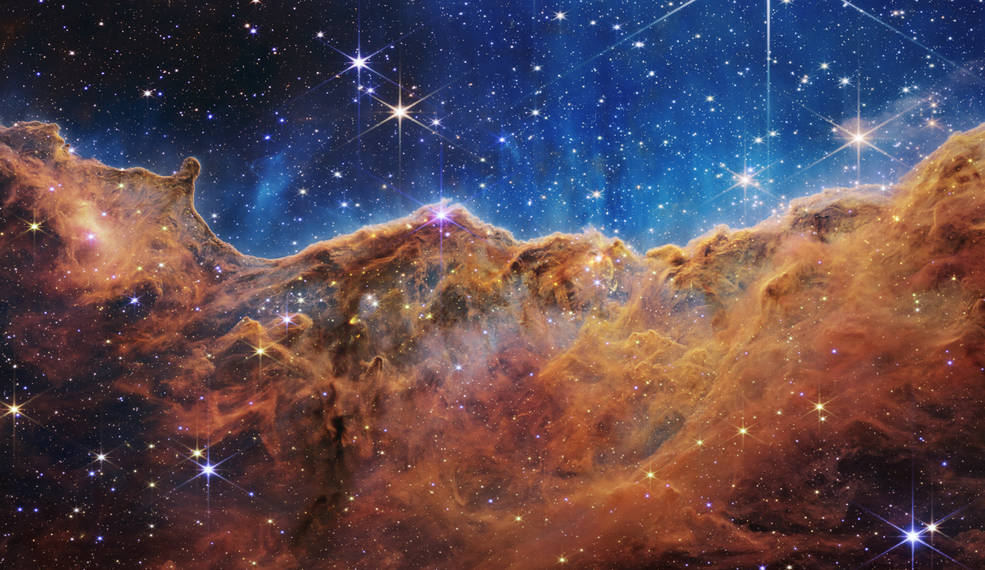by Brooks Riley

Looking back at the year gone by is the tedious task of news editors who aim to make sense of the senseless, find connections where none exist, and leave us with a neat package of nostalgia to file away in our collective memory. I’ve never been partial to such wrap-ups, with their facile interpretations of events, their mining for relevance where none exists.
Another thing that makes such year-end assessments so difficult, is the necessary conjunction of events of varying levels of gravitas: Imagine talking about Twitter king Elon Musk in the same breath as Vladimir Putin, mentally blending images of a digital town meeting with a security council meeting at the Kremlin. One shudders at the juxtaposition of wounded infants in Ukraine with the trivial issue of buccal fat surgery. After a while, all newsworthy events in a given year begin to appear surreal, existing side by side inside separate vacuums that bump into each other like bumper cars at an amusement park.
Part of me doesn’t care much for the immediate past. Part of me wants to get on with it, whatever ‘it’ is. Slowly but surely, I’ve evolved from being a participant in life to being an observer of it. From my modest command center I gaze out at the world through a digital lens and try to understand what’s going on. It’s becoming much harder to do that.
As an observer now, I am less tolerant of the rampant vanities let loose on social media. I find many more public figures ridiculous, and many viral trends simply absurd. (Is it me, or is it them?) My inner curmudgeon stretches its limbs like a newborn, even as it is forced to coexist with my inner teenager who, for some reason, is still alive and kicking.
As much as I’d like to move on to next year, it’s difficult to shake the shocking events of this one. It was a year dominated by grand delusions, especially those of a few men-children whose sense of entitlement far outweighed their intelligence. They differ in scale, but all are linked to what seems to be an epidemic of toxic narcissism.
To news of the Russian invasion of Ukraine on February 24, my two immediate reactions took the form of questions. The first, ‘What century is Putin living in?’ and the second, echoed only days ago in an essay by Timothy Garton Ash, ‘How could Putin do this to his own people?’ It was clear from the outset that Putin was ruining the future of his own country for generations to come. Whatever the outcome of this war, from now on, very little positive will happen to the Russian people–the real prisoners of war in one man’s delusional fantasy. They will be vilified, ostracized, tokenized, and demonized, even if every soldier has a mother. Vacations in Budapest or Minsk won’t mitigate being persona non grata everywhere else.
As the atrocities on the civilian population of Ukraine pile up, there’s evidence of a national psychopathology in Russia, one filtered down from the top—where the unimaginable savagery of one man launching missiles from behind a very long dinner table is now kitted out to his untrained rabble of an army in place of food and equipment. ‘Whatever you do,’ it seems to say, ‘do harm.’ While he drops bombs on infrastructure, hospitals, kindergartens, theatres, schools, parks, homes, anywhere civilians might be, his own army are dropping their guns, abandoning their tanks and fleeing for their lives (leaving a trail of senseless killings). It seems that the Russian soul is in a dark place.
Which brings me back to my first question: What century is Putin living in? In June, he compared himself to the 18th century tsar Peter the Great, a figure he seems not to know much about beyond the recapture of territory from the Swedes to build St. Petersburg. Unlike Putin, Peter the Great was an ardent admirer of the West, of Europe—living there for more than a year and borrowing its customs and culture for the betterment of his people. In reality, Putin is living in the twentieth century, when role models like Hitler and Stalin showed him just how ruthless one man could and would be to try to get what he wanted. Putin’s policy of genocide of Ukrainian civilians may be more localized, but there’s no doubt that his tactics, rehearsed in Syria, are crimes against humanity.
What I’ve learned from this war is that it moves in and out of our consciousness, like a book to be put down for a while and then picked up again. Even if I wake up every morning with Ukraine on my mind, there will be some hours when I don’t give it a thought. Still, just below the surface, the inexplicable cruelty that defines the invasion infuses my brain with chronic sorrow. Did World War II affect people the same way? Born near the end of it, I’m sometimes horrified that my blissfully unaware first few months of life coincided with so much death and destruction.
***
As for the other grand delusionists from the year gone by, they have one thing in common: hunger for respect. When he bought Twitter, Elon Musk imagined himself turning a global town meeting into. . . a global town meeting. His erratic actions and reactions in subsequent weeks could be described, to put it kindly, as killing, then beating a dead bird. Twitter may rise again from the mess, but Musk may not emerge unscathed.
And lest we forget, in November that grandmaster of delusions, Donald Trump, announced his intention to besmirch the office of the Presidency a second time around.
***
What century are we living in? When Iran’s allegedly holy men use rape and execution as weapons against protesters, when the Taliban prohibits higher education for women, when the Supreme Court of the United States withdraws a woman’s rights to her own body, when antisemitism and other forms of racism spread like poison through the land of the free?
History seems to be moving backwards, full steam ahead to the past, with its tragic mistakes glossed over or questionably rewritten.

2022 was full of good news, too. The James Webb telescope, itself looking ahead to the past—a past billions of light years ago—gifted us with dazzling images of our feverish universe. Advances in fusion power moved us a step closer to a future without fossil fuels. The Committee investigating the January 6 attack on the Capitol released its fulsome, damning report. Megan Thee Stallion was vindicated for seeking justice. And Lionel Messi raised the World Cup for Argentina, which needed it more than he did.
***
If the outcome of the war in Ukraine could be decided on imagery alone, Ukraine would have already won. At the end of this troublesome year, here’s a juxtaposition for the history books:

US Congress united in applauding Volodymyr Zelensky, while Putin holds a press conference at a distance of several long dining tables from the tiny press corps forced to remain standing and huddled together as they take dictation.

